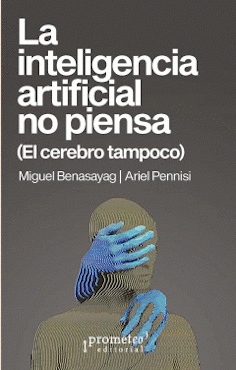Did the machine domesticate the human being?, with Miguel Benasayag and Ariel Pennisi

Complete interview in Spanish: https://www.youtube.com/watch?v=p6kPZ95Hlkc&t=40s
The authors of “Artificial intelligence does not think (neither does the brain)”, Miguel Benasayag and Ariel Pennisi, analyze the risks of what they call “techno-scientific colonization of the living”, explain why what seemed like science fiction is on its way to ceasing to exist. be and they raise a question: do we function or do we exist? Open Channel Editorial | Artificial Intelligence (AI) is present in the facial detection of cell phones, in virtual voice assistants such as Apple's Siri, Amazon's Alexa or Microsoft's Cortana and in most of the applications on our everyday devices. The machinery works thanks to the contribution we make in each search on Google or similar, thus providing a large database and feeding an algorithm (an ordered set of systematic operations that allow making a calculation and finding the solution to a problem).
In Artificial intelligence does not think (neither does the brain), Miguel Benasayag and Ariel Pennisi problematize the different dimensions of the challenge represented by this unprecedented technological leap in the history of humanity, particularly from the massive dissemination of chats based on Intelligence. Artificial. Contrary to a media system eager to headline definitive sentences, Canal Abierto proposes a dialogue with more questions than answers about the ethical and political difference between organism-artifact hybridization, the risks of a techno-scientific colonization of the living and the functioning-existing dichotomy. .
In this Hypothesis, it may (not) be true, Miguel Benasayag philosopher, psychoanalyst, researcher in neurophysiology, doctor in Psychopathology at the University of Paris VII and Ariel Pennisi - university professor, essayist, collaborator of the Institute of Thought and Public Policies, co-director of Editorial Network and driver-.

Miguel Benasayag He was born in Buenos Aires, in 1953. He studied medicine at the UBA, and after being arrested by the Argentine dictatorship, he went into exile in France in 1978. Philosopher, epistemologist, doctor in psychology, interdisciplinary researcher, he is the author of forty books, translated to more than fifteen languages. Former university professor, he founded and coordinates the "Malgré Tout" study and militancy collective in France and Italy.

Ariel Pennisi Essayist, teacher and researcher (UNPAZ, UNA), member of the Social and Philosophical Studies Group (IIGG-UBA), co-director of Red Editorial, member of the Institute of Studies and Training of the CTA A and the Institute of Thought and Policies Public. He published New institutions (of the common); The Anarch (philosophy and politics in Max Stirner), with Adrián Cangi; If they want to come, let them come. Malvinas: genealogy, war, left, with Ariel Petruccelli, Federico Mare and Andrea Belén Rodríguez; Black Pope. Essays, stories and recipes; Globalization. Sacredization of the market: As author and compiler: Basic income. New possible commons and Lynchings. The police within us. He published numerous essays and articles in books, magazines and national and foreign portals. He collaborates with the newspaper Tiempo Argentino.






